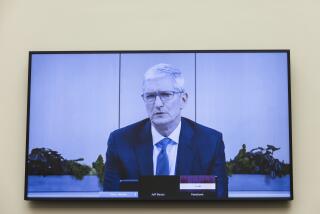Apple, RealNetworks Not in Perfect Harmony
- Share via
Apple Computer Inc. Chief Executive Steve Jobs finally had something to say to RealNetworks Inc. CEO Rob Glaser, and it wasn’t “I’d like to teach the world to sing.”
For months, Jobs had ignored Glaser’s entreaties that Apple enable its iPods to play songs from Real’s downloadable music store. So Glaser did it without Apple’s help: This week, Real unveiled a technology dubbed Harmony that makes the tracks it sells work on iPods and other players.
That would seem to benefit Apple, which might sell more iPods if there were more places to buy tunes. But Apple hardly seemed grateful.
“We are stunned that RealNetworks has adopted the tactics and ethics of a hacker to break into the iPod,” Apple said Thursday. The company, based in Cupertino, Calif., pledged to investigate whether Seattle-based Real broke the law.
At the heart of the conflict is the major record companies’ demand that downloadable-music stores wrap their songs in electronic locks. To the industry’s chagrin, Real, Apple and Microsoft Corp. developed incompatible anti-piracy techniques. Hence the Real-iPod predicament, which Real thought it had resolved.
“So let me get this straight,” said Real spokesman Matt Graves. “Apple is complaining we’re helping them sell more iPods?”
Federal law forbids the circumventing of anti-piracy technologies such as Apple’s Fairplay. To figure out how to move songs onto an iPod, Real may have had to pick the Fairplay locks, legal experts say.
Real says it did no such thing. Even if it did, the law provides an exception for circumventions done for the sake of interoperability or research, according to experts.
“It certainly seems reasonable for Real to have done what they did,” said Edward W. Felten, a computer science professor at Princeton University who drew the music industry’s ire by trying to publish research on the ineffectiveness of a key anti-piracy technology. “But the boundaries of the law and the boundaries of the reasonable are not always the same.”







